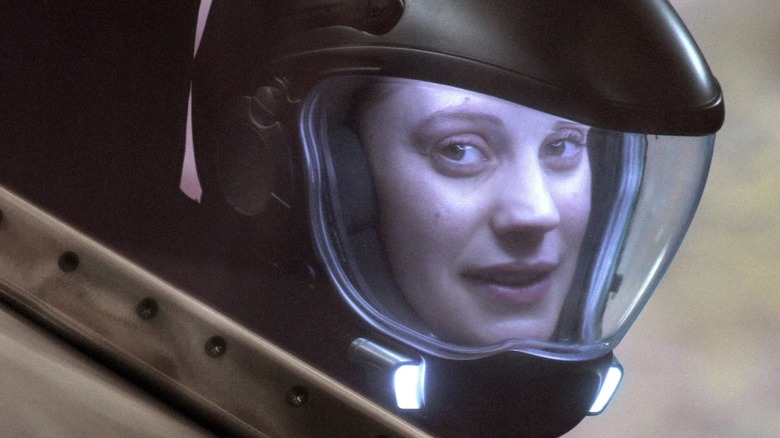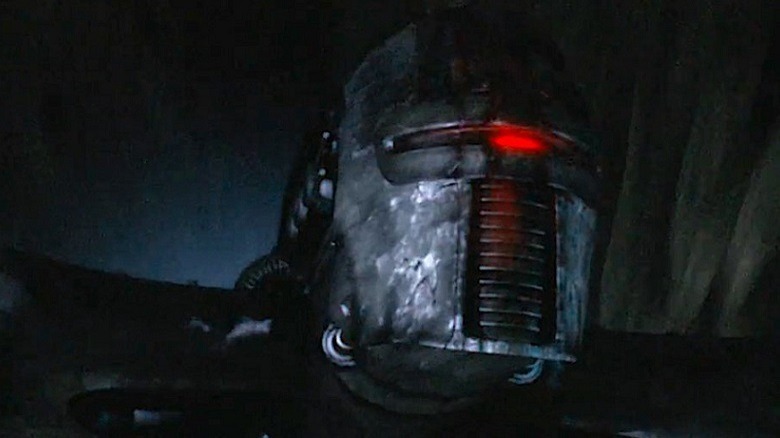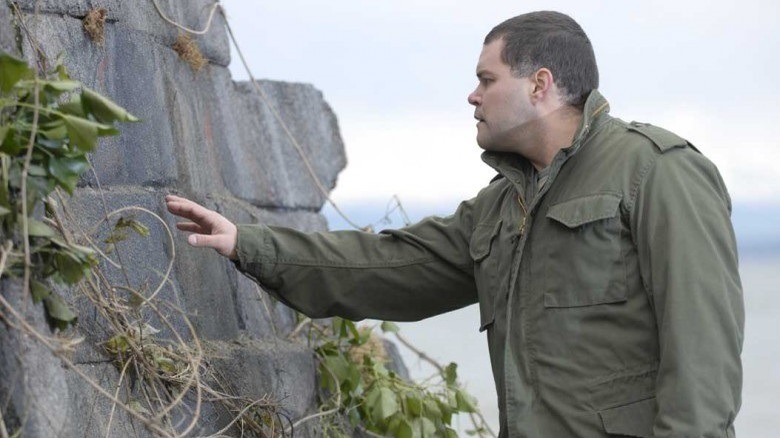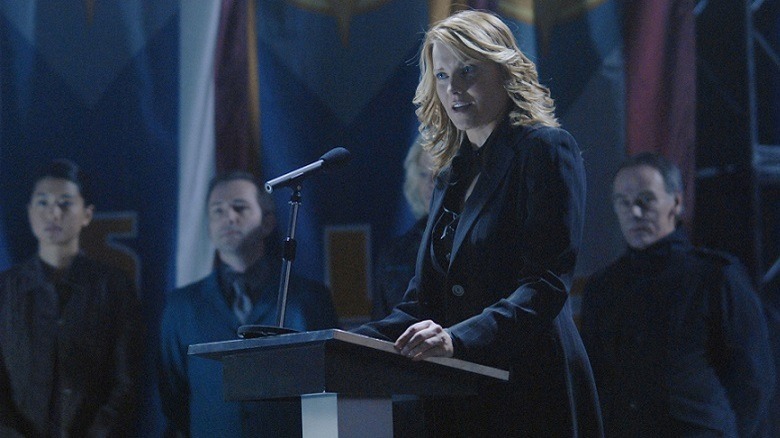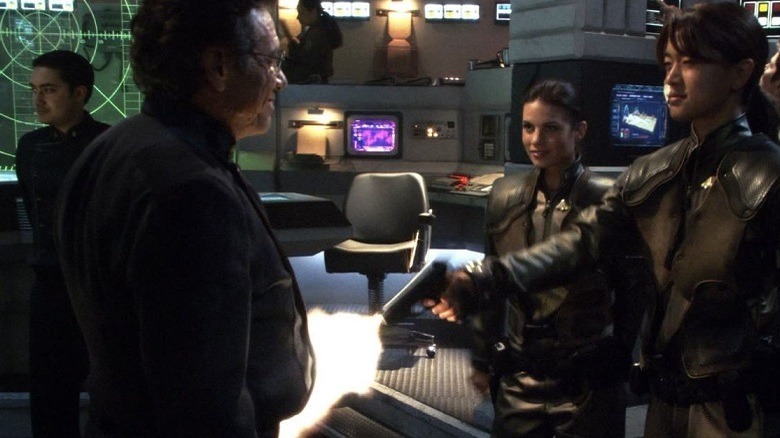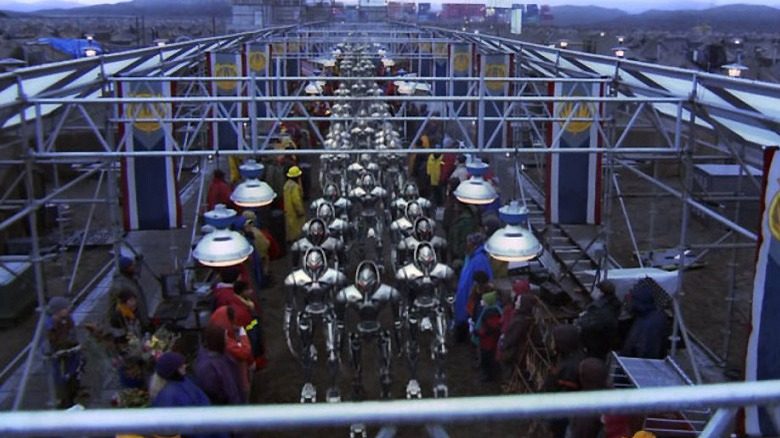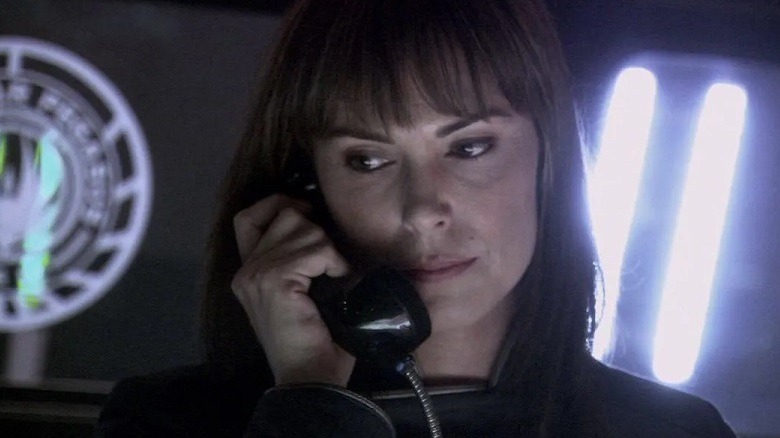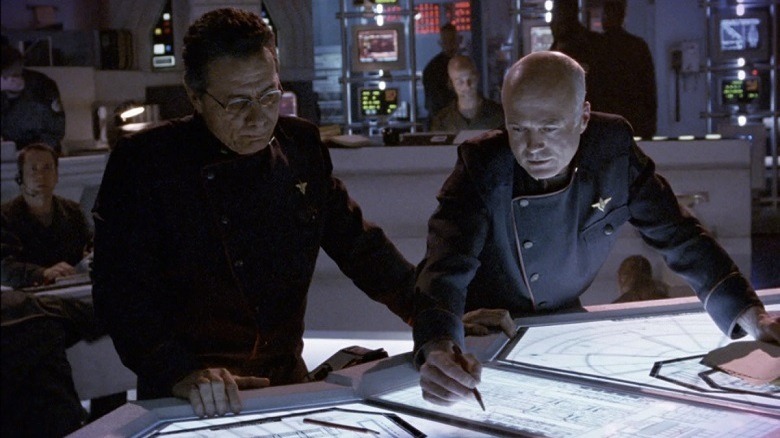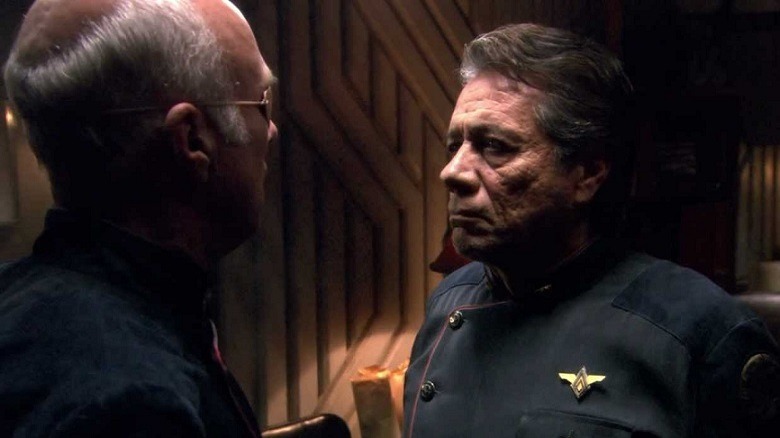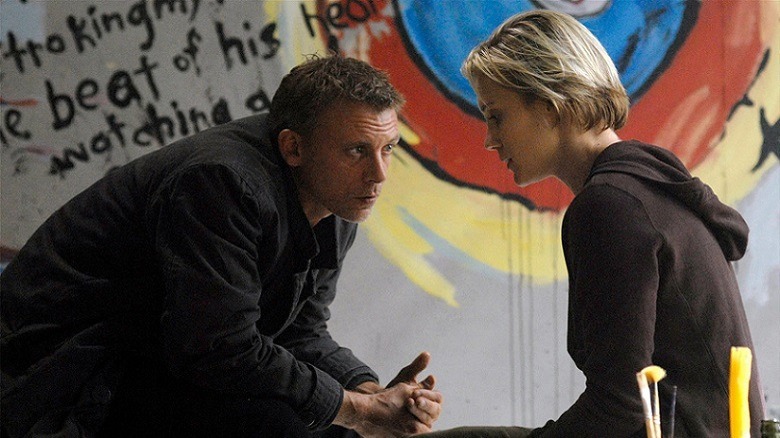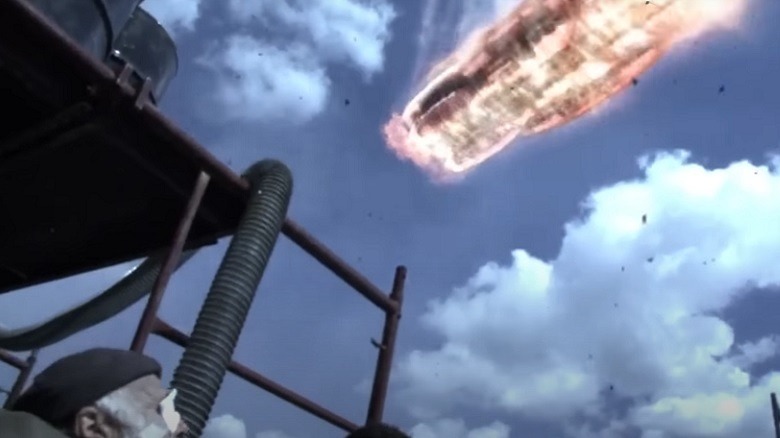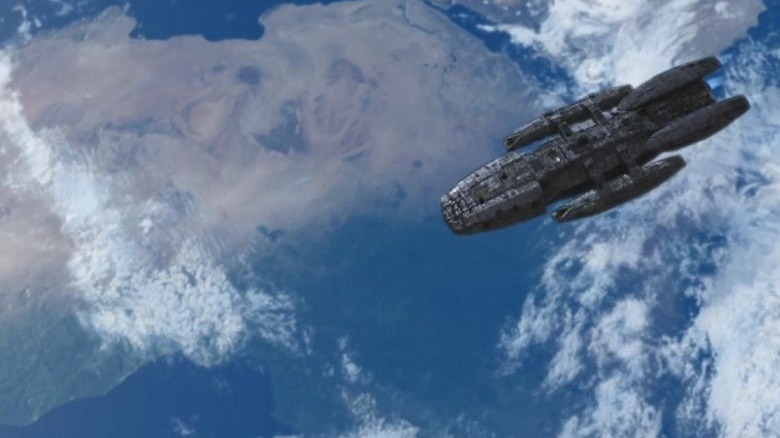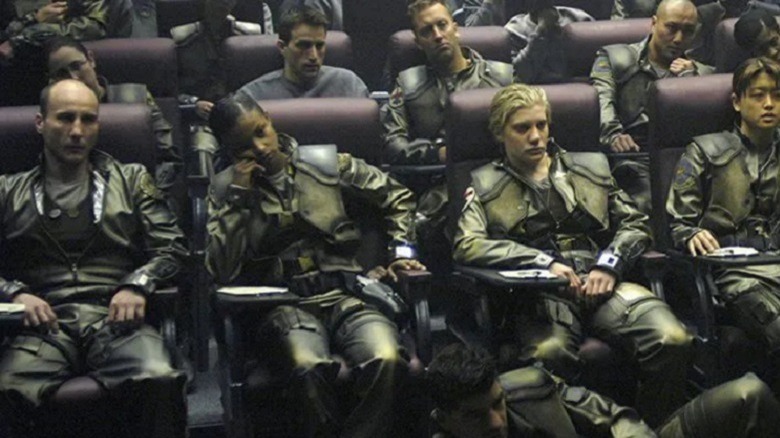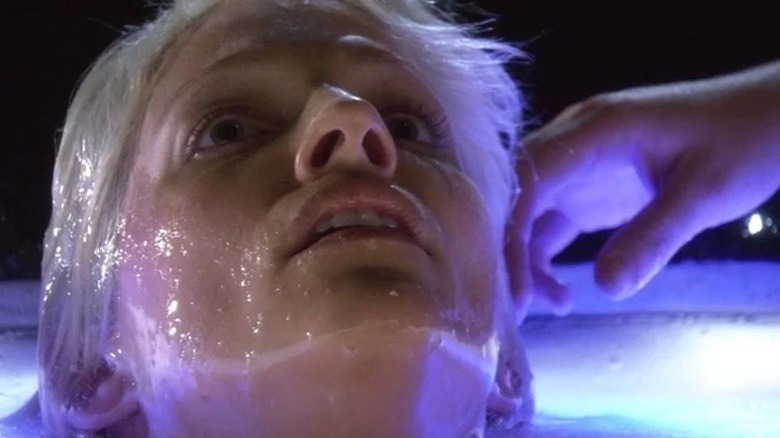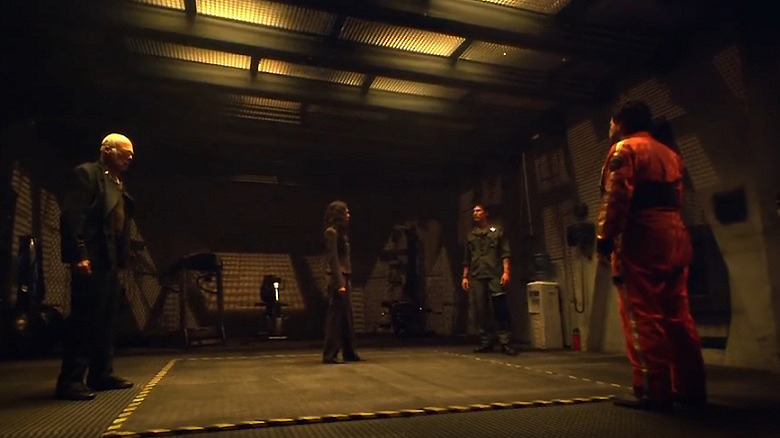The 14 Best Battlestar Galactica Episodes, Ranked
The re-imagined "Battlestar Galactica" series, developed by Ronald D. Moore and David Eick, hit our screens in 2003. The ongoing story would eventually end in 2009, having picked up several accolades — including winning Emmys and Hugo awards — along the way. Telling the tale of the titular capital ship and its ragtag fleet of civilians and military personnel, "Battlestar Galactica" follows the last remnants of humanity fleeing their robotic race (and humans' former slaves), the Cylons. In an era obsessed with grim and gritty reboots, "Battlestar Galactica" stood out as a television series that honored the original series and charted brave new territory, too.
Moore and Eick's series was as much a study of theology as it was a military drama with detailed and complex character stories. Throughout the Battlestar's long journey to find a new home, the show would create some of the most memorable sci-fi television episodes to date. We'll dissect the best ones here. So say we all!
Scar (Season 2, Episode 15)
Whereas "Battlestar Galactica" was extremely game to explore the concept of its immortal humanoid infiltration Cylons, it was less keen to expand on the universe's old-school mechanized counterparts. These KITT-eyed Silver soldiers and their ilk got short shrift, so it was nice to see an episode concentrating on that side of Cylon society.
Scar is a Cylon raider, wreaking havoc on the human fleet. The robot is notorious for effective sneak attacks — like Baron Richthofen in a metal shell. The "Act of Contrition" episode previously established that Raiders contained cybernetic and organic material, so this foe is more than artificial intelligence. Scar is sentient and smart, making Starbuck (Katee Sackhoff) determined to destroy it.
The handheld-style camerawork always bought the best out in the show's dogfights, and it works perfectly here. Scar and Kara are reflections of each other: They're zealots. However, Scar has the advantage of resurrection, growing more hateful with each rebirth. The episode is a tense cat-and-mouse setup, but it's also key to understanding how Starbuck's blind obsession overrides everything — even the safety of her teammates. "Scar" contains the first proper glimpse of Starbuck's nihilistic nature and willingness to die for her beliefs.
Sometimes a Great Notion (Season 4, Episode 11)
"Galactica" prided itself on the strength of its reveals, and its "Sometimes a Great Notion" episode is full of them! This one outing had enough mythology-busting moments and shocks to fill an entire season of other shows. But somehow, the show managed to handle them all without losing focus.
"Sometimes a Great Notion" was the last episode written before the 2007 writer's strike, making it easy to wonder whether the creative team suspected that this might be their last time working on the show. Dealing with the aftermath of "Revelations" — which saw Earth being a long-abandoned irradiated necropolis — "Sometimes a Great Notion" handles the fallout of that discovery.
With an episode that could have concentrated on the crew's despondency, it barrels along with revelation after revelation. Starbuck discovers her corpse in a crashed Viper and starts to doubt her existence. William Adama (Edward James Olmos) and Saul Tigh's (Michael Hogan) strained relationship reaches breaking point, and Lt. Anastasia Dualla (Kandyse McClure) takes her own life. Yet none of these major plot points overshadow the excellent pacing of this energetic story. Even for a story so late in the Battlestar Saga, this episode proved the series could still shock viewers.
Occupation (Season 3, Episode 1)
"Occupation" may have taken us away from the cramped interiors of the Jupiter Class Capital Ship Galactica. But the bleached-out and bleak world of New Caprica is no less claustrophobic.
Four months have passed during the Cylon Occupation. Recently released from captivity, Saul has lost an eye, and Starbuck is under house arrest with the creepiest of captors. What little resistance exists is under threat from the New Caprica Police, a Hitler-youth-style organization of turncoat humans.
What places this episode on the list isn't just the story's setting but the sheer visceral despondency it conveys. These are people on the verge of giving up hope, forced to resort to desperate measures. Guerilla tactics aren't effective, so Saul urges them to take extreme measures. It can't be a narrative coincidence that at the same time desperate New Capricans were strapping bombs to their chests, Iraqis were doing the same in real life. The detonation amongst the ranks of New Caprica Police at their graduation is a powerful, potent, and shocking moment — and as such, it would be impossible not to put "Occupation" on this list. However, its unrelenting dour tone means it won't place higher.
Kobol's Last Gleaming, Part 2 (Season 1, Episode 13)
With the second half of this two-parter having so many memorable moments, it's hard to catch your breath. Cylon secret identities become known, and Adama and Roslin's (Mary McDonnell) adversarial relationship comes to a head with the termination of her presidency — not to mention more revelations about the Cylons' plan! This season 1 finale contains genuine, edge-of-your-seat tension, though the episode ends with some relief.
On the verge of being commended for destroying a Cylon Basestar, Sharon (Grace Park) draws her sidearm and shoots Commander Adama in the chest. Despite hints of Sharon's nature throughout season 1, it's still as shocking a turn now as it was then. The following scenes play out simply to music as the incredulous bridge crew reacting to what has just happened — and it's just as well because the audience was so shell-shocked that they couldn't have processed anything else.
"Kobol's Last Gleaming" is a textbook example of how to pace a season finale while ending on a cliffhanger. Many shows claim that after the events of a season finale, nothing will be the same. But here, it applies. However, in doing so, the series set itself up for a hard act to follow, with every season having to end with a major revelation.
Lay Down Your Burdens, Part 1 (Season 2, Episode 19)
Only a brave writing team could take a series pulling in over two million viewers and perform the audacious rug-pull "Lay Down Your Burdens" delivers. This episode's plotline threatened to dramatically alter the nature of the show, but that's exactly what the Galactica team successfully did.
This episode revealed that Cavil (Dean Stockwell) is Number One, but its storyline primarily focuses on the impending Presidential election. Baltar (James Callis) faces incumbent President Roslin as the fleets colonize the hostile environment of New Caprica. But the episode's daring move comes shortly afterward. We leap more than a year forward in the story and to nobody's surprise, President Baltar is next to useless in the role — narcissistic as ever. The episode ends with the arrival of the Cylons and Baltar's subsequent surrender on behalf of his colonists.
To abandon some plot threads — and skip ahead with a whole bunch more — is a bold move that doesn't entirely pay off. But this episode belongs on this ranking for its sheer cheek. Kudos to the writing team for always keeping the viewers on their toes.
Pegasus (Season 2, Episode 10)
Commander Adama had hoped they would find survivors out in the wild, and "Pegasus" is an example of being careful what you wish for in the galaxy. When Galactica encountered the Mercury-class Battlestar Pegasus, they thought their prayers to the Lords of Kobol had been answered. However, nothing in the series is ever straightforward.
Admiral Helena Cain (Genre stalwart Michelle Forbes) has kept the Pegasus safe by an iron will. The differences in leadership styles between Adama and Cain are glaring from the jump, but the complexity here is that Cain outranks the beleaguered Battlestar Commander.
"Pegasus" is a fascinating look at differing leadership styles and how stark approaches affect characters. Adama may be old-fashioned and sentimental, but the war has driven every ounce of compassion out of the stern-faced curmudgeon that is Cain. Whereas Adama has kept his crew and fleet safe through calculated conflict avoidance, Cain has taken the battle to the Cylons with guerilla-style raids. Her performance is a little one-note, and it's a surprise there was no mutiny on her ship. Still, it's down to the audience and their conscience to determine which approach they think is correct. However, it neatly sets the scene for the boiling, complex tensions between the two jaded warriors.
2003's Battlestar Galactica - The Miniseries
The last appearance of Galactica on our TV screens was the risible and short-lived "Galactica 1980." Richard Hatch, who portrayed Captain Apollo in both incarnations of the series, had been pitching for a revival of the series to no avail.
But in 2003, a three-hour miniseries aired on the (then called) Sci-Fi channel. The miniseries became a backdoor pilot to what became one of the best science-fiction series of the decade. Even Hatch — who was quite vocal in his disdain for this reboot — succumbed to its charms. He later portrayed the role of Tom Zarek in the series' "Bastille Day" episode.
The reboot had a distinctive look, portraying a grimly realistic view of military life amidst humanity's possible extinction. Space action scenes were filmed in a reportage style — as if shot on grainy handheld cameras. Unlike the original series with its gleaming silver robot adversaries, here, the Cylons had evolved, taking human form as perfect infiltrators. For its unique vision, this miniseries places high on this list. However, a miniseries is an odd way to start a series. As a result, its pacing doesn't hold up as well as the 2004 series. But as it stands, its pilot episode is a perfect declaration of the show's mission statement, defining the great subsequent reboot series.
Revelations (Season 4, Episode 10)
The mid-season finale of season 4 is a great reminder to never get our hopes up toward the end of a story arc. Whereas the bulk of the episode covers a tense stalemate between the Cylons and the humans, the conclusion of this episode lingers more in fans' memories.
Armed with navigation data from her mysteriously intact Viper, Starbuck believes she's found the location of Earth. But the final shot is heartbreaking. After such jubilation at the supposed end of their long and arduous journey, we witness a parade of ships flying toward their intended new home. With the sudden ominous click of a Geiger counter, Adama releases a handful of irradiated infertile soil. The devastated crew and the accompanying equally dejected Cylons survey the dead world they've found.
The final scene in "Revelations" plays without dialogue, apart from a single mournful word from President Roslin amidst series music composer Bear McCreary's elegiac score. As well as a timely message that humanity can't catch a break, it's a potent reminder about the cyclical nature of the plot. While it's not perfect — the sudden discovery of Earth feels shoehorned into the story — but still belongs in the top 10.
Maelstrom (Season 3, Episode 17)
While "Maelstrom" is a more introspective episode than most of the series, it's no weaker for it. Haunted by dreams of visions of the Eye of Jupiter artifact, Kara Thrace fears that she's losing her mind. When she nearly dies from atmospheric pressure during an encounter with a Heavy Raider, Commander Adama considers grounding her, doubting her aptitude.
Changing the gender of Starbuck — one of the series leads in the original Galactica — was always a controversial choice. But there's no doubt that actress Kate Sackhoff consistently proved the critics wrong. Her Starbuck was believable, nuanced, and a skilled fighter pilot. This episode is a testament to her talent and the writers' deft writing of her character.
"Maelstrom" not only explores more of her background and motivation but pushes the central plot along excellently. The episode is a tale of faith and legacy. For it to end with Starbuck's demise in the cockpit of her viper makes it even more poignant. Of course, she would return. But at the time, it genuinely seemed like we'd seen the last of this overconfident fighter jock. Of course, this isn't the first or last time Galactica would have an episode so fixated on a single character's downfall. However, this stands out as one of the best.
Exodus, Part 2 (Season 3, Episode 4)
"Exodus, Part 2" contains two standout moments that were the highlight of the series run and during an excellent third season. We see rescues and reunions getting the crew back into space, and Baltar joins the Cylon Fleet.
After such an atmospheric build-up, it's hard not to cheer the sheer audacity of Adama's plan to free the colonists. In the most striking visual of the series, Galactica jumps into the upper atmosphere of New Caprica, launching Vipers as it free-falls towards the planet's surface. However, the ship jumps to safety at the last moment.
Despite the success of this initial stage, it looks like they're all doomed as four Cylon Basestars close in — twice as many as they'd suspected they'd be fighting. But when it looks like all is lost, the Pegasus, commanded by Lee Adama (Jamie Bamber), appears. In a monumental decisive battle, the Pegasus rams into the Basestars. The camera pans upward to show Pegasus at the periphery of the conflict and closing into battle. When the fleet is united once more, the viewer remembers to breathe again.
This episode would place higher on the list if not for some gaping plot holes. While it's an audacious plan by Lee, it doesn't make much sense. But for excitement alone, it stands.
Daybreak, Part 2 (Season 4, Episode 20)
As we've seen from several great television series — like "Game of Thrones" and "Lost" — it's often difficult for a show to pull off its series finale. Even the original 1978 "Battlestar Galactica" suffered from a lousy conclusion with a similar deus ex machina helping them locate Earth. Regardless of your opinion on the series finale of 2004's "Battlestar Galactica," in which the crew ends up on a primitive Earth-like world, implying humanity will cycle through this A.I. battle again, there's no denying that this episode has some of the absolute best moments.
The battle in "Daybreak, Part 2" is its biggest battle against the Cylon colony and is nothing short of breathtaking, as is the ensuing ground battle. Chief Tyrol's (Aaron Douglas) reaction upon learning of Tory's (Reka Sharma) betrayal is another standout moment, as is Galactica's final FTL jump when the hull finally buckles.
There's a poignancy as Adama takes one last flight around his broken flagship, mourning its departure as much as the crew lost along the way. While it's not a perfect ending, it was a perfectly respectable way to bow out. Spectacle may outweigh logic here, but there was never going to be a simple or satisfactory resolution to these intricately threaded plotlines.
33 (Season 1, Episode 1)
The first proper episode after the 2003 mini-series, "33" is the tensest 45 minutes of television you'll likely find. Hammering home the desperate position of the Galactica and its rag-tag fleet of survivors from the outset, it defines the series' conflict as one of attrition. The Cylons are not subject to the same weaknesses as humans: They do not tire or need rest, and "33" establishes their dedication and determination.
The episode name comes from the number of minutes humans have between each FTL Jump and being rediscovered by Cylons. Narration-wise, it's set five days after the events of the 2003 mini-series. When we join the crew they've been going through the same cycle of 33 minutes for nearly a week, and the relentless attacks from the Cylons are taking a toll.
Galactica and its crew are exhausted. Sleep deprivation affects their ability to work. Plans become immediately thwarted. "33" neatly defines the parameters of the scale of conflict at hand. In this episode, we gain an insightful look at the tactics of a mechanized enemy and meet a flawed crew facing the consequences of their failure and teasing struggles yet to come.
Downloaded (Series 4, Episode 20)
Any episode of a television series that breaks with tradition takes a risk. For every novel story like the gold standard of musical episodes "Once More with Feeling" from "Buffy the Vampire Slayer," there's "Lost Sister" from "Stranger Things" — an outing that unnecessarily breaks the flow of the plot, and feels decidedly out of place.
But then "Battlestar Galactica" crafted a Cylon-centric episode from the perspective of the monotheistic mechanoids! It might sound on paper or as silly as the plotline of "Shades of Gray" from "Star Trek: The Next Generation," but that would be doing it a great disservice.
After seemingly dying in a nuclear conflagration at the end of 2003's "Battlestar Galactica," "Downloaded" opens with the resurrection of Six (Tricia Helfer). We follow her dealings with Cylon society. Plot elements only hinted at before — such as the workings of the Resurrection Ship and the unusual interconnection of Six and Gaius — are explained in more detail. This perspective gives an excellent way to explain later decisions in the series made by Six. Her villainous character becomes nuanced and sympathetic.
Due to its brave storytelling powers, this episode belongs on this list. For a story that hinges entirely on the mutating machinations of the Cylons — indeed, the opening credits ended with the quote, "And they have a plan" — it was a masterstroke to see behind the Wizard of Oz-like curtain and observe that plan in detail.
Crossroads, Part 2 (Season 3, Episode 20)
When Galactica goes for revelations, it goes big. Considering how epochal the previous two season finales had been, anticipation was high. Considering how heavily season 3 focused on Cylon identities, it felt likely that one of the Cylons from the final five would be revealed in "Crossroads, Part 2." The main plot revolved around the long-awaited trial of traitor-to-humanity Gaius Baltar: The result was a verdict nobody could have suspected. But this wasn't the episode's main reveal.
To the beats of "All Along the Watchtower," Anders (Michael Trucco), Tory (Rekha Sharma), Tyrol (Aaron Douglas), and Tigh find themselves drawn to one location on the ship. They glance at each other with the stunning realization that they're all Cylons and have been unbeknownst to themselves or the viewer for three seasons. As Bear McCreary's music rises to a crescendo, countless jaws of the audience must have dropped open.
Yes, the logic might not entirely hold together. (How does this song even exist in this universe if we're in pre-Earth days?) But as a spectacle, it's nothing short of incredible. For an episode that juggles so many disparate elements, it's a masterclass in pacing and atmosphere. "Crossroads, Part 2" showcases its cast's dramatic talents and ends with a killer punchline. In a lesser television show, something that fundamentally changes the story would fall flat or feel cheap. Here, it only reminds you how incredibly stunning "Battlestar Galactica" is.
